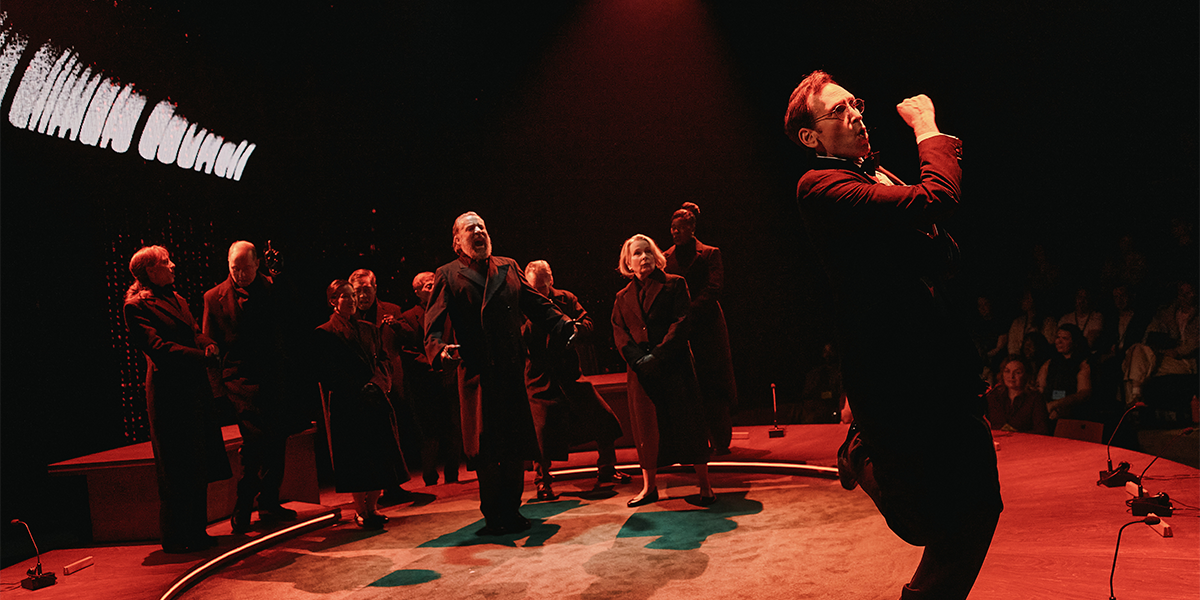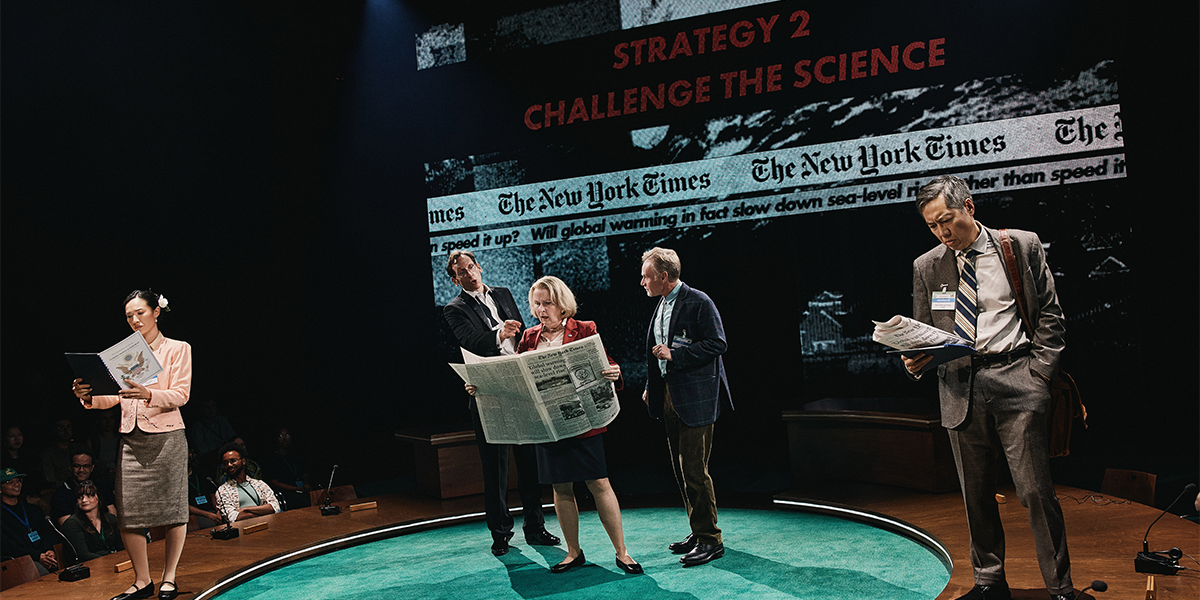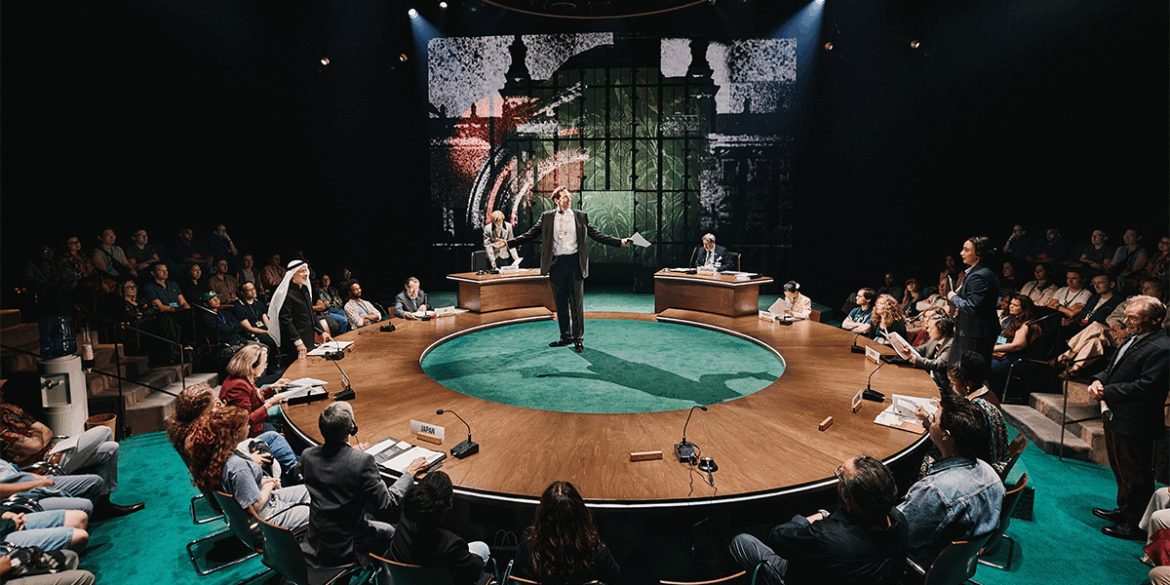Read our review of Kyoto off Broadway, a new play by Joe Murphy and Joe Robertson now playing with Lincoln Center Theater after two acclaimed London runs.
If a political drama about the many bureaucratic meetings and committees that led to some bigger meetings that led to conferences that led the United Nations to finally take up a treaty on climate change sounds boring, never fear: Kyoto is anything but. It is fast-paced, loaded with information, and a true ensemble vehicle that uses each inch of designer Miriam Buether’s set to bring audience members closer to the action. You will laugh, you will jeer, you may be served champagne, and your head will spin with the thrill of political theatre.
Does the fanfare of Kyoto pack a punch, however? Lawyer-turned-lobbyist Don Pearlman’s (Stephen Kunken) second-act screed about the carbon dioxide emitted by U.N. delegates flying to the conferences would hit harder if single-use plastic water bottles weren’t sold at intermission and Lincoln Center Theater’s season weren’t sponsored by American Airlines. This fictionalized version of Don seems to have written the playbook on turning to your enemy and saying, “See, you also participate in society, therefore you can’t critique it,” but this verbal jousting barely works on the characters around him, let alone on the audience before him.
Kyoto’s reveals rest on Don’s wife, Shirley Pearlman (Natalie Gold), staying in the dark until an activist (Daniel Jenkins) plays deus ex machina and casts a true light on her husband. The idea that a political wife who earned her stripes in the Reagan administration would be so utterly clueless is as laughable as Don’s assurance that the ‘90s were a simpler, nicer time without war (except in Yugoslavia) or police brutality (except in Los Angeles) or climate disasters (except in Kuwait).
Some of this frustration is intentional: Don’s opening monologue about how our current world is bad but his was good is, if not farcical, then purposefully hypocritical. His life was stable amid turmoil because of his proximity to power, and as the play goes on, he would hardly deny this. Some people and countries are more equipped to help than others, he concedes to Raúl (Jorge Bosch), Argentina’s delegate, who remains relentlessly committed to hope.
Playwrights Joe Murphy and Joe Robertson’s slow unveiling of the truth — that Don is not an everyman, but an oilman — is gratifying, leaving you mad enough to be inspired to act but not so depleted of trust that you can’t. It is Kyoto’s reliance on Shirley, the playwrights’ remaking of her in their own image, that causes the play to falter. Shirley does not leave Don or even really confront him; she does not devote the remainder of her life to righting his wrongs or turn her back on the status his lobbying got her. At the end of the show, Shirley addresses the audience as just another modern person disappointed by our lack of progress in fixing the climate crisis, as if we are all on equal footing in our ability and choice to act.
Where was this spirit throughout the show, when she flitted in and out of scenes carrying Don’s shirts and reminding him to put down his cigarette once in a while? Like Don, Shirley is not an everywoman, but a fixer in her own right, comfortable in her life of privilege. Murphy and Robertson’s fantasy sours Kyoto’s otherwise exhilarating race to extinction.

Kyoto summary
Kyoto traces the international conferences of the 1990s that led to the development of the Kyoto Protocol, a landmark United Nations treaty on greenhouse gas emissions and climate change. Kyoto is narrated by Don Pearlman (Stephen Kunken), an American lawyer who is convinced by shadowy, nefarious actors to attend the conferences as a non-U.N.-delegate observer.
Don likens himself to a neutral narrator but soon reveals that his own political history and ambition make him anything but unbiased. He eventually becomes a lobbyist on behalf of various oil companies and the government of Saudi Arabia, leaving his wife (Natalie Gold) and colleagues, like Argentine mediator Raúl Estrada-Oyuela (Jorge Bosch), ever more confused and frustrated.
Kyoto is based on actual events leading up to the December 1997 conference in Kyoto, Japan. The ensemble portrays the U.N. delegates from various nations that played key roles in developing the Protocol, including Kiribati (Taiana Tully), Germany (Erin Darke), and the United States (Kate Burton).
What to expect at Kyoto
Kyoto runs approximately 2 hours and 30 minutes, including a 15-minute intermission. On arriving, audience members receive lanyards identifying their role at the conference (I was the nation of Nauru). Audience members seated at the table where much of the action is staged may be asked to participate in the show, including by responding to questions posed by the actors, standing at specific moments, and holding various props.
Kyoto includes fog and contains discussions of climate-related catastrophes, cancer, death, and racism and colonialism.

What audiences are saying about Kyoto
Kyoto has an audience approval rating of 86% on the review aggregator Show-Score.
Show-Score user Davidunger recommends buying a ticket that seats you at the table to get the full Kyoto experience, including audience participation.
Show-Score user Hara praises directors Stephen Daldry and Justin Martin for their “ingenious” staging of Kyoto.
Show-Score user GreatAvi calls Kyoto “alive and immersive,” noting that the smaller Mitzi E. Newhouse Theater fits the feel of the show.
Read more audience reviews of Kyoto on Show-Score.
Who should see Kyoto
Fans of political dramas and real-world politics will geek out over Kyoto’s dramatization of international diplomacy.
If you’ve enjoyed previous Lincoln Center Theater offerings, like last season’s McNeal, you’ll want to catch cast member Peter Bradbury as Fred Singer, a physicist who rejected the scientific consensus on climate change (among other things, like sun damage causing skin cancer and secondhand smoke causing lung cancer — he was a lot of fun at parties).
If you frequent the Royal Shakespeare Company’s productions across the pond, you won’t want to miss the imported Kyoto on the American stage.
Learn more about Kyoto off Broadway
Despite some structural shortcomings, Kyoto is worth seeing for the history lesson alone. Murphy and Robertson’s play helps us understand how we got to our current political moment and reminds us that some of the most important actors on the world stage are working behind the scenes.
Learn more about Kyoto on New York Theatre Guide. Kyoto is at the Mitzi E. Newhouse Theater through November 30.
Photo credit: Kyoto off Broadway. (Photos by Emilio Madrid)


AloJapan.com